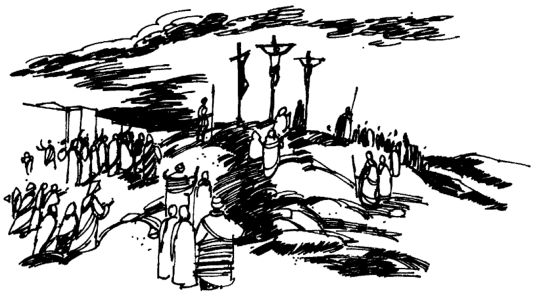Recognizing the Reality of
Man’s Sin Via Human Agency
By Jeff Belknap
In the recent past, we have been told that since some unlawful divorces are not approved of by God, they are not real or “recognized” by Him. Hence, some people who have been unscripturally put away are supposedly not really put away. Consequentially, this denial of the reality of divorce opens the door for a put away person (whom they claim is not really put away) to later “put away” and remarry “another” if their estranged mate commits fornication after the divorce.
The most prevalent argument being made against the reality of an unscriptural divorce is that the civil court does not have the power to put away a person who remains “true to the ‘marriage bond.’” The brethren who argue such, claim that God does not relinquish the control to put away into the hands of a civil judge. In a sense this is true, for Jesus taught that it is the ungodly spouse who ultimately does the putting away, not a judicial system.
We are told that if we recognize civil law when it contradicts God’s law, then we are placing man’s law over God’s law. Through such an argument, the emphasis of responsibility for sin is shifted – from the one who God says is ultimately responsible for causing the spouse whom they divorce “to commit adultery” (Mt. 5:32a) – to the agency and procedure that the mate uses to ratify his/her unscriptural action. Such argumentation over procedure is a moot point because, in reality, the brethren who claim these things believe there is no procedure (whether in or outside of the civil courts) whereby a person who “remains true to the ‘marriage bond’” can really be put away.
However, the following examples definitively show that man indeed has the power (though not the divine authority) to sin against others by using the civil government to carry out his evil plans:
Example # 1 (INDIVIDUALS ACTING VIA HUMAN AGENCY)
Without question, the Jews were charged with crucifying the Lord (Acts 2:23, 36; 3:14-17; 7:52; I Thess. 2:14-15; et al). How did THEY accomplish such an unlawful injustice against God Himself (Jn. 18:31)? They committed their crime by means of human agency (i.e. the ruling officials). They delivered Jesus to stand before Pilate the governor (Mt. 27:1):
“Then saith Pilate unto him, Speakest thou not unto me? knowest thou not that I have power to crucify thee, and have power to release thee? 11 Jesus answered, Thou couldest have no power at all against me, except it were given thee from above: therefore he that delivered me unto thee hath the greater sin” (Jn. 19:10-11).
Obviously the scripture teaches that governing authorities have the “power” (ability) to do good or evil. Moreover, Jesus himself stated that this ability (free will) was given them FROM ABOVE! Furthermore, although the governor took part in this sinful injustice, Jesus taught that the greater sin was committed by those who delivered him up to the governing authority!
Did this terrible injustice really occur? Did the governing authority really have “the power” (ability) to bring about the Lord’s physical demise? I Peter 2-3 and John 19 teach us that God gave various authorities the power (though not approval) to make decisions that effect the affairs of its subjects in both just and unjust ways.

Is this an example of man’s law ruling over God’s law?
Example # 2 (INDIVIDUALS ACTING VIA HUMAN AGENCY)
Jesus taught His disciples, “The servant is not greater than his lord. If they have persecuted me, they will also persecute you” (Jn. 15:20; cf. II Tim. 3:12). In other words, if they deliver up the Savior of the world before the human authorities to be persecuted, do not be surprised if and when it happens to you too (Jn. 15:18)!
Notice what Jesus said men (through human agency) would do to His gentle and innocent creatures:
“Behold, I send you forth as sheep in the midst of wolves: be ye therefore wise as serpents, and harmless as doves. 17 But beware of men: for they will deliver you up to the councils, and they will scourge you in their synagogues; 18 And ye shall be brought before governors and kings for my sake, for a testimony against them and the Gentiles. 19 But when they deliver you up…21 And the brother shall deliver up the brother to death, and the father the child: and the children shall rise up against their parents, and cause them to be put to death” (Mt. 10:16-21, 28a).

Is this an example of man’s law ruling over God’s law?
Now I ask you dear reader, how did these “men” cause their relatives to be put to death? By human agency! They delivered up their own family members “before governors and kings.” Innumerable disciples were persecuted in such ways in the first century. Will we deny the reality of these Biblical facts because the civil authorities carried out these activities that were perpetrated against God’s will? If we concede that these atrocities occurred, does it mean that we are guilty of saying God’s Law was superceded by the law of man? Absolutely Not!
Evil prevailed because it was God who gave the authorities power – both to do good by punishing evil (in accordance with God’s will), and to do evil by causing the good to suffer unjustly. Such injustices will always take place as long as this wicked world stands (I Jn. 5:19). Moreover it was the Christians’ very manifestations of faithfulness to God that caused them to be delivered up and then executed by unjust Roman civil authorities. Were not these (unprotected) consequences real to the persecuted Christians of that day?
More Examples of Individuals Acting Via Human Agency
In the gospel of Matthew 5:25 Jesus said, “Agree with thine adversary quickly, whiles thou art in the way with him; lest at any time the adversary deliver thee to the judge, and the judge deliver thee to the officer, and thou be cast into prison,” (cp. Lk. 12:58).
Jesus taught that it is “the adversary” who delivers one to “the judge,” and that one needs to seek reconciliation lest the one they have offended pursue them to the fullest extent of the law. In this context, it is obvious that it is primarily the actions of one’s adversary – not the judge – that result in their being “cast into prison.”
Though it does not appear so in this case, there are times that such “civil” proceedings are absolutely unjust. As in the case of Jesus, those with the most power, money and “tricky” lawyers can and do exact misery on even those who have done no wrong, for James wrote, “Do not rich men oppress you, and draw you before the judgment seats?” (Jas. 2:6).
Additionally, we learn that some members of the church at Corinth had “a fault” (I Cor. 6:7), which caused reproach on Christ. Paul wrote, “Dare any of you, having a matter against another, go to law before the unjust, and not before the saints?…But brother goeth to law with brother, and that before the unbelievers.” (I Cor. 6:1-7).
When an individual sues another in a court of law, it is understood that “the judge” or the judicial system itself is not responsible for the suit; it is the plaintiff. The court is not doing the suing, it is the individual (who seeks restitution or financial gain or retribution or justice) through human agency. That is why such court cases brought reproach against the body of Christ at Corinth: its members were the ones responsible for bringing unnecessary public suits against their very own brethren.
Applying These Truths to Divorce and Remarriage
In no uncertain terms, the Lord taught that man may unlawfully put away his spouse (Mt. 5:32a; 19:9a; Mk. 10:11-12; Lk. 16:18a). Through the accomplishment of this ungodly act, Jesus taught that it is the man who puts a stumbling block of “adultery” in the path of the poor, blameless mate (Mt. 5:32a).
In three gospel accounts, we find Jesus teaching that whoever marries the one who is divorced – both lawfully and unlawfully commits adultery (Mt. 5:32b; 19:9b; Lk. 16:18b; cf. Rom. 7:2-3). Such a statement indicates God’s recognition of the possibility for man to “cause” his mate to suffer injustice and undue temptation because of his own sin in carrying out an unlawful divorce.
While different civilizations have employed various customs and procedures to accomplish such an injustice, human agency is the most worldwide, age-old and prevalent means by which this is (and has been) accomplished by individuals. But our modern-day change agents are seeking to modify this established order (I Cor. 14:40; Rom. 13:1-2; Tit. 3:1; I Pet. 2:13-17) and call it “Biblical putting away.” Nevertheless, there’s absolutely nothing “Biblical” about a post-civil-divorce putting away and subsequent remarriage to another!
|
Matthew 5:32, “But I say unto you, That whosoever shall put away his wife…causeth her to commit adultery: and whosoever shall marry her that is divorced committeth adultery” (cp. w. Mt. 19:9; Mk. 10:11-12; Lk. 16:18) |
Is this an example of man’s law ruling over God’s law?
Here, Jesus taught that man has the capability to put away his spouse and “cause” her to commit adultery, just as family members in the first century could “cause” their relatives to be put to death (Mt. 10:21, 28)! Men accomplish such injustices against others by delivering them up “before governors,” (i.e. civil authorities) to do so. Yet, scripture says that it is the husband who puts away the wife (Mt. 5:32a; 19:9a; Mk. 10:11; Lk. 16:18a), and it is the wife who puts away her husband (Mk. 10:12).
However, we are now being told that when civil authorities act without divine approval, they have no power to effect an unlawful divorce when one spouse remains “true to the ‘marriage bond.’” Such is the convoluted reasoning behind claims that unwilling, innocent put away people are not really put away because they are “protected by the law of God.” Although confidently affirmed, no scripture has ever been cited to support such an idea (cf. Col. 3:17; I Pet. 4:11).
Why would loyalty to God’s law ensure protection for some people, but cause others to suffer death for fidelity to it? It appears that divorce and remarriage is the only area in which God’s law is supposed to physically protect those who remain true to his word. If not, pray tell what other area(s) such physical protection is offered to Christians for their faithfulness?
Again, how does one accomplish an unlawful putting away? The same way they obtain a lawful divorce. Through human agency! Yes, the authorities have a part in ratifying and effecting the wrong, but it is the individual who is guilty of “the greater sin,” when he/she does what Jesus called “put away” - for a cause other than fornication (Mt. 5:32a; 19:9a; Mk. 10:11-12; Lk. 16:18a).
|
Luke 16:18, “Whosoever putteth away his wife, and marrieth another, committeth adultery: and whosoever marrieth her that is put away from her husband committeth adultery.” |
“Judge in yourselves:” Is this an example of man’s law ruling over God’s law?
Let us refuse to be steered away from the simplicity in Christ via denials of the reality of sin and its ability to effect detrimental consequences against the innocent.